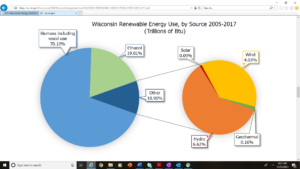Did you know that wood energy makes up a large percentage of Wisconsin’s renewable energy consumption? In 2017, biomass (including wood) accounted for an estimated 70% of the state’s renewable energy use. Are you a business, school or institution interested in learning more about whether wood energy is a good fit for you? See how the Forest Products Services program can help!
Wood utilization
Wausau’s New Partners In Urban Wood Utilization
By Andrew Sims, City Forester, Wausau/Marathon County Parks, Recreation, and Forestry Department
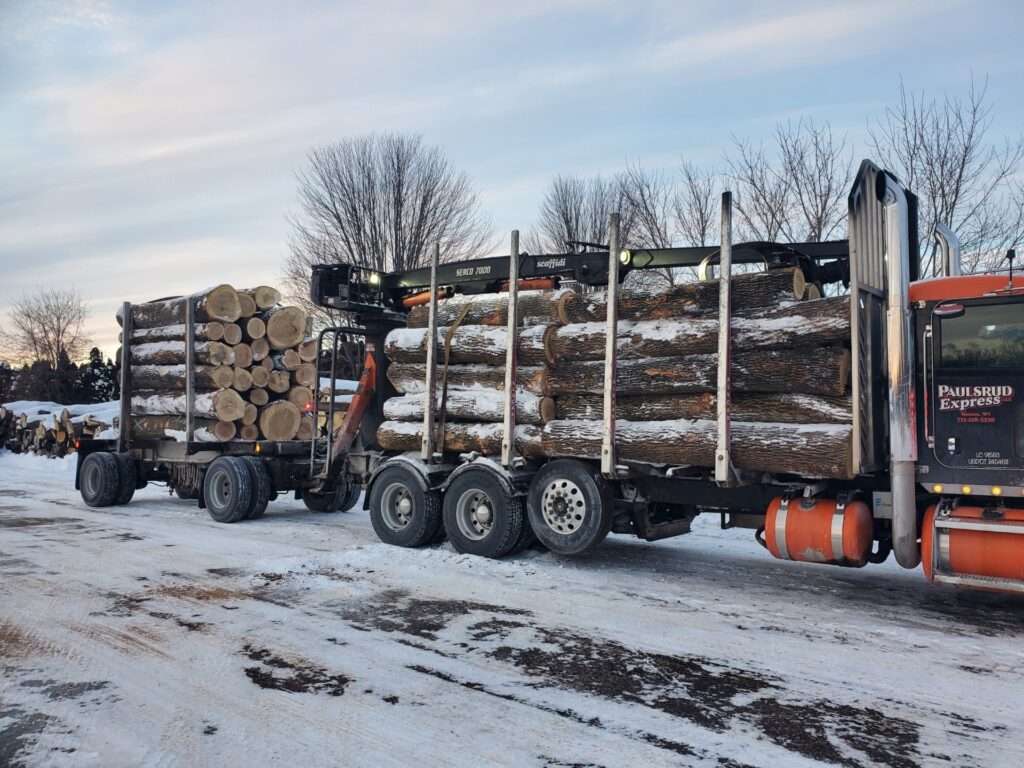
Urban Evolutions
Urban wood utilization has become a popular topic of conversation within the arboriculture community. Not only is it a ‘feel good’ opportunity for communities to dispose of urban forest products, but a much-needed source of revenue as well.
Historically, Wausau contracted with a local logger to haul material to mills. This contract was primarily for the pulp market, as many sawmills won’t accept urban wood due to unknown foreign objects. As a result, much of the oversized material did not have the best end-use. Some were sold on auction by the truckload, and the rest was left to decompose. Finding those key partnerships, and being able to capitalize on them, was the key for Wausau to become successful at utilizing urban wood. A short description of two of the City of Wausau’s new partnerships follows.
Continue reading “Wausau’s New Partners In Urban Wood Utilization”
USDA seeks ash trees to battle EAB
Emerald ash borer (EAB) is an invasive insect from Asia that was first introduced into the United States in 2002. Since its discovery, EAB has caused the death and decline of tens of millions of ash trees. Today, the U.S. Department of Agriculture (USDA) is using ash trees against the pest to help preserve and protect the tree species. Staff in the USDA EAB biological control (biocontrol) program are asking Wisconsin landowners in Sheboygan, Fond du Lac and Door counties to help by donating infested ash trees for use in raising wasps that attack and kill EAB.
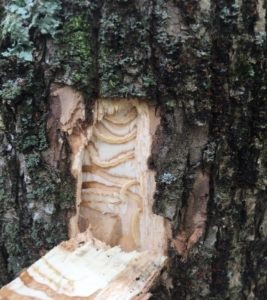
USDA staff cut a “bark window” in green ash to uncover signs of EAB.
Large-scale urban tree removal using mechanized logging equipment
By Don Peterson, Wisconsin Urban Wood
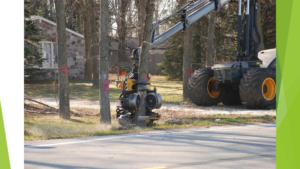 With thousands of trees on their properties, municipalities and other urban ownerships sometimes need to remove a large volume of trees at once, such as after an insect or disease outbreak (i.e., emerald ash borer) or a catastrophic weather event (wind/tornadoes or ice/snow damage). When this need arises, what are the options available to remove these trees efficiently, safely, cost effectively and quickly?
With thousands of trees on their properties, municipalities and other urban ownerships sometimes need to remove a large volume of trees at once, such as after an insect or disease outbreak (i.e., emerald ash borer) or a catastrophic weather event (wind/tornadoes or ice/snow damage). When this need arises, what are the options available to remove these trees efficiently, safely, cost effectively and quickly?
Mechanized logging equipment has become the standard for traditional tree harvests in most of the country’s rural forests. Using this type of equipment in urban tree removal projects is in its infancy, but it can be a very effective tool in the right circumstances.
Advantages of tree removal by mechanized logging equipment include:
Continue reading “Large-scale urban tree removal using mechanized logging equipment”
Please complete the Wisconsin Urban Wood research survey
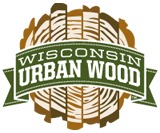 Wisconsin Urban Wood is conducting a research project with support from the Forest Service to develop and demonstrate best practice standards for urban wood utilization in Wisconsin; including describing the:
Wisconsin Urban Wood is conducting a research project with support from the Forest Service to develop and demonstrate best practice standards for urban wood utilization in Wisconsin; including describing the:
• Amount of urban wood generated in Wisconsin and its fate;
• Incentives and barriers to furthering wood utilization in Wisconsin; and
• Educational and technical needs associated with urban wood utilization.
Wisconsin Urban Wood sent out the survey via emails to tree service companies and municipalities. If you haven’t yet, please complete the survey as requested. While your response is critical to Wisconsin Urban Wood’s research, we also encourage you to participate for your own benefit. This research will help the Forest Service and Wisconsin Urban Wood develop and improve urban wood education and technical assistance in Wisconsin.
For more information about the survey or about Wisconsin Urban Wood, please contact 608-622-7212 or director@wisconsinurbanwood.org.
Biochar 101 and potential applications
By Sabina Dhungana, forest products specialist, Madison, 608-220-4531
The Forest Products Services program in cooperation with the USDA Forest Service hosted a webinar highlighting the fundamentals of biochar. Biochar is an emerging forest product that is derived from woody biomass and other organic feedstocks. The use of biochar has gained considerable interest in the agricultural field, and it presents opportunities for utilizing available biomass sources. Topics covered in the webinar included: Biochar markets and uses, biochar production systems, and applications in vegetable growing. The webinar has been archived and can be viewed here.
Wood energy assistance for Wisconsin businesses
By Sabina Dhungana, forest products specialist, Madison, 608-220-4531
The Wisconsin Statewide Wood Energy Team (SWET) is a public-private partnership that aims to expand markets for converting woody biomass into energy while advancing installation of commercially viable wood energy systems in both public and private facilities. These efforts support forest restoration, wildfire mitigation, urban wood utilization and other sustainable forest management goals. The WI DNR Forest Products Services program is a member of SWET and currently coordinates the team’s efforts across Wisconsin.
SWET was initially established in 2015 by a USDA Forest Service grant. During the grant period, the team completed seven wood energy analysis projects in Wisconsin for a wide range of entities such as wood industries, hospitals, cheese factories, and schools. Facilities sought out this free assistance to better utilize locally available wood residues while understanding potential cost savings of wood energy. SWET members worked with interested facilities by collecting essential information such as facility energy needs, utility costs, woody biomass availability, and any potential future energy demands. The cost/benefit analysis was then conducted in cooperation with an engineering firm contracted by USDA Forest Service.
With the continuation of wood energy efforts across Wisconsin, your facility can take advantage of this free assistance from SWET. If you are interested in a free wood energy analysis, please contact Sabina Dhungana via email at Sabina.Dhungana@wisconsin.gov or call her at 608-220-4531.
October 16 – urban wood webinar: using local materials to enhance design & sustainability on projects
Do you have an interest in learning more about urban wood as a locally and sustainably sourced option for wood building materials? Is your community, organization or company planning for renovations or new construction projects? If you answered yes to either of the above, we invite you to check out an upcoming webinar from Wisconsin Urban Wood on this very topic. Continue reading “October 16 – urban wood webinar: using local materials to enhance design & sustainability on projects”
Value-added Wood Manufacturing Industry Survey Results
By Scott Lyon, Forest Products Specialist
The value-added wood manufacturing industry (or secondary wood manufacturing industry) includes companies that use primary wood products such as lumber or veneer to produce higher value products, such as flooring, cabinets, millwork, furniture, sporting goods, doors, windows, roof trusses, wall panels, and other building materials. The industry includes more than 800 facilities, employs more than 20,000 workers, and generates a direct economic impact $3 billion in Wisconsin (WI DWD 2019; IMPLAN DATA 2017).
Continue reading “Value-added Wood Manufacturing Industry Survey Results”
Mass Timber University Grant Program
The announcement below has been reprinted with the written permission by the US Forest Service – Forest Products Laboratory and its original author, U.S. Endowment for Forestry and Communities.
The U.S. Endowment for Forestry and Communities (Endowment), in partnership with the United States Department of Agriculture’s Forest Service (USFS), announced the initiation of the Mass Timber University Grant Program (grant program) and related Request for Proposals (RFP) to promote the construction of mass timber buildings on institutions of higher learning campuses across the U.S. The intent of the grant program is to inspire interest in and support for mass timber products among the architectural, developer and building communities as well as the public, by showcasing them in highly-visible projects on university campuses.

